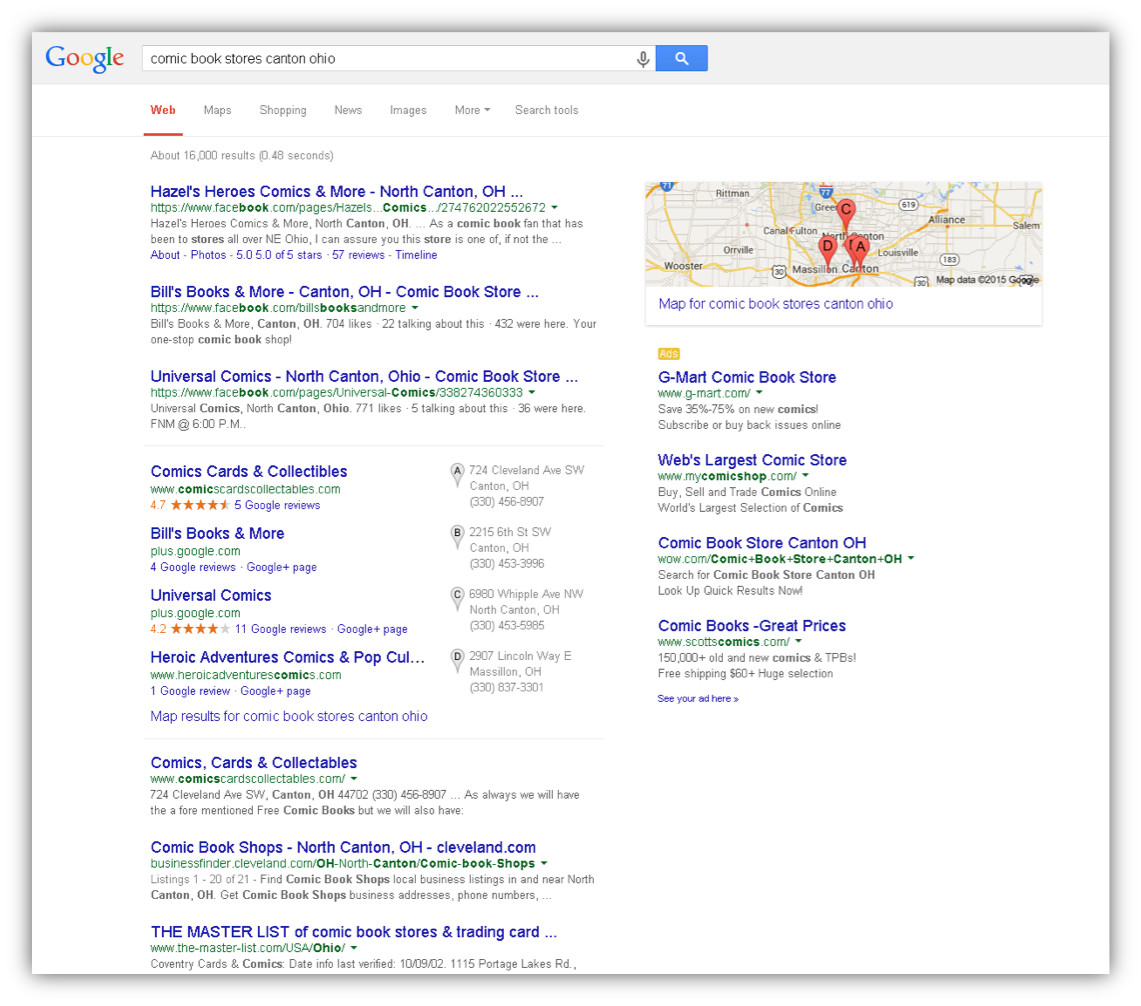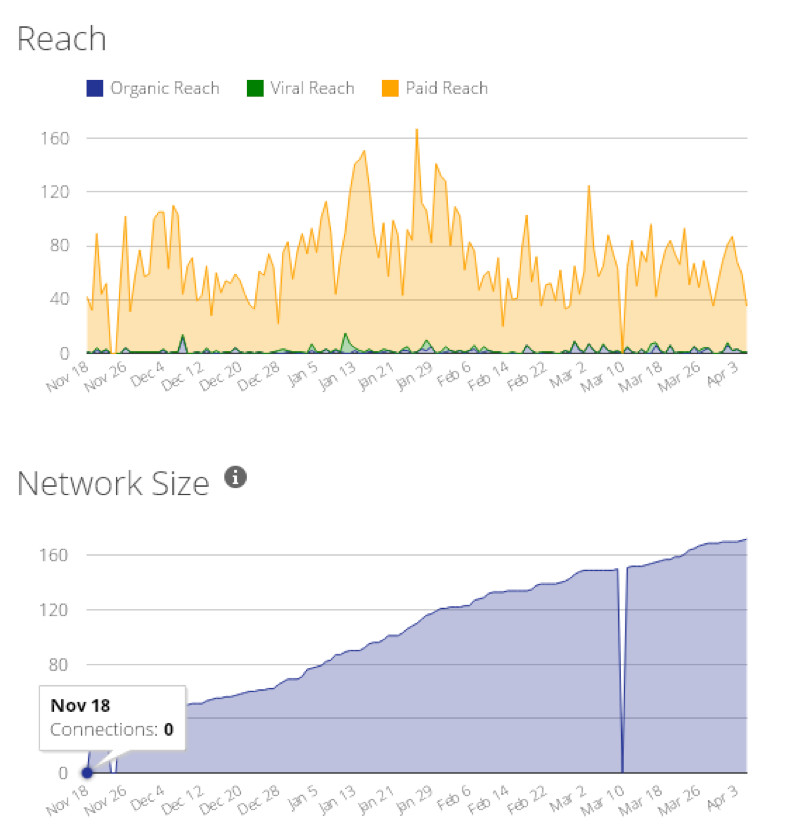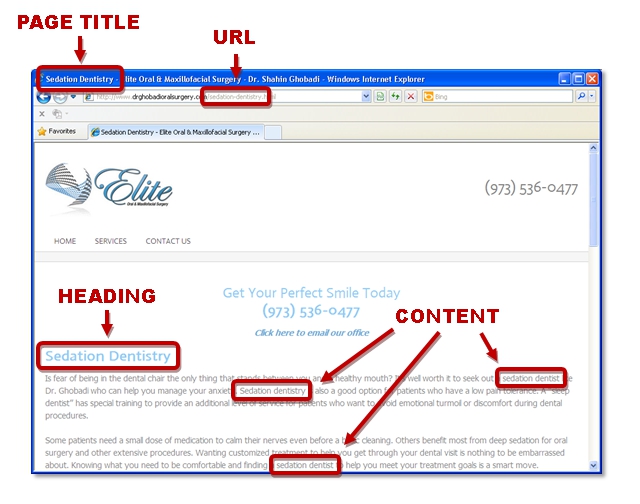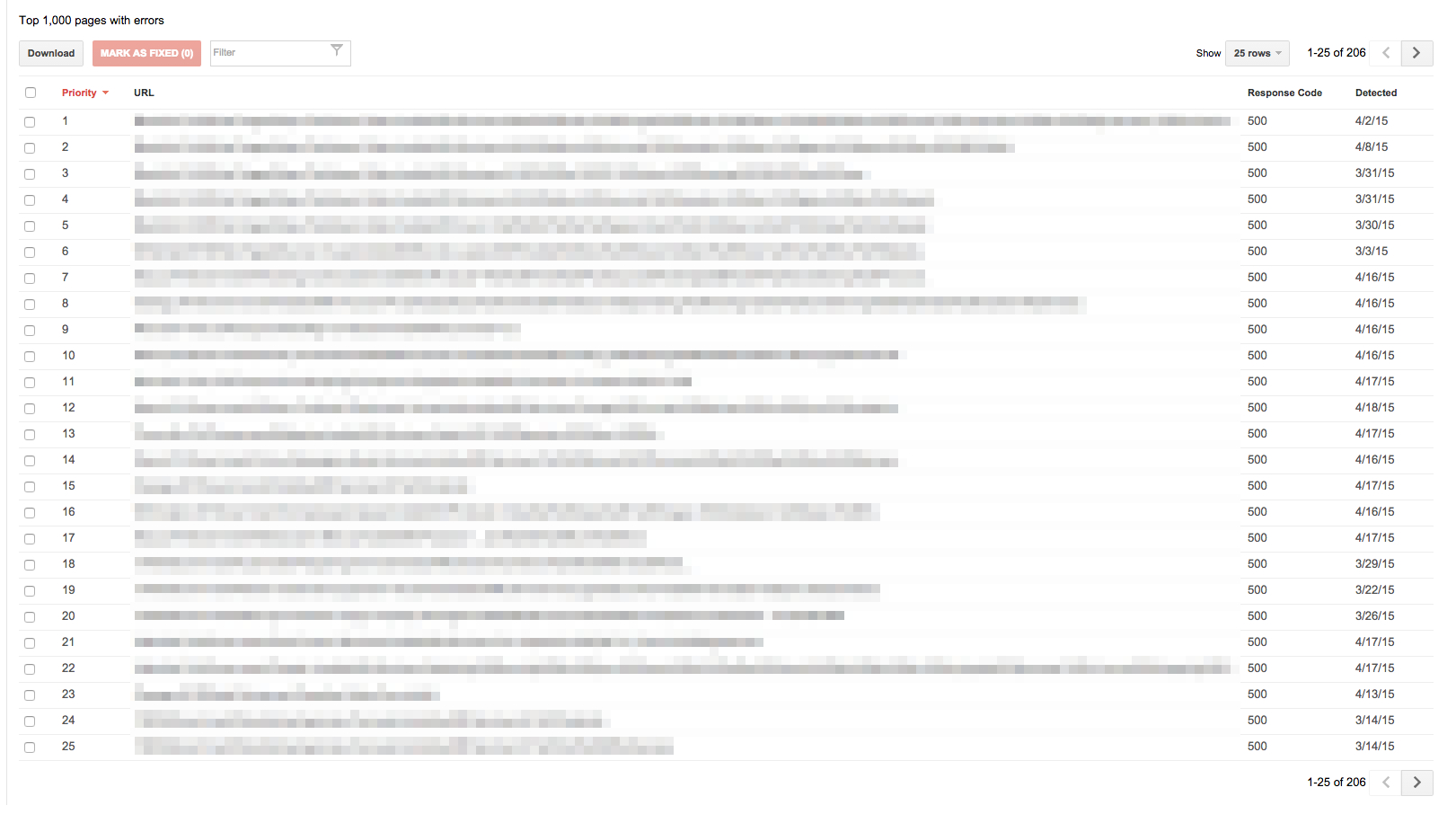- 1. Get Started with Social Media
- 2. Give Your Website a Facelift
- 3. Play Nice with Mobile Users
- 4. Look Under the Hood
- 5. Get Listed, Get Found
- 6. Leverage Offline Relationship for Inbound Links
- 7. Get Customers Talking about You
- 8. Become a Content Marketing Rock Star
- 9. Go Viral with Video
- What’s Next?
- Frequently Asked Questions (FAQs) about SEO for Small Businesses
This article was sponsored by SEO PowerSuite. Thank you for supporting the sponsors who make SitePoint possible.
Search engine optimization can be defined as “everything you do to improve your visibility in search engines.” But SEO has evolved beyond mere on-page optimization and link building. Once unrelated fields like social media and content marketing have become necessary ingredients to a successful search engine optimization strategy. So, here are nine ideas for improving your visibility in the search engines—on a budget, of course.
1. Get Started with Social Media
Social Media and SEO
Although Google doesn’t use social media activity as a ranking factor, there’s a strong correlation between the two. In one case study, a company’s website rankings increased by 6.9 percent after their Facebook Page received 50 likes and 70 shares.
What’s more, in February, Twitter struck a deal with Google to make tweets visible in Google’s search results as soon as they’re posted. According to TechCrunch:
Twitter estimates that there are some 600 million people who already land on Twitter pages as “logged-out” (that is, unregistered) users, compared to the 288 million registered monthly active users it has today.
You Don’t Need to be on Every Platform
Before you head off to create your Twitter account, ask yourself if whether its users fit your customer demographics. Facebook has the most evenly-distributed demographics of any platform (albeit apparently rapidly abandoned by teens in lieu of Instagram and Tumblr).
Instead of trying to be on every platform, just go where your customers are.
Why Facebook Pages Rank Well
Google treats social media pages just like any other webpage—its bots crawl the site and add the information to its index (i.e., database).
However, Facebook is not just “any other webpage.” It’s the third most-used site on the Internet. As an “authoritative” site, you can capitalize on its propensity to rank well.

In the screenshot above, the number one position for this search query is the store’s Facebook Page. What’s more, it’s the only listing for that store that appears in the SERP.
The owner told me that that Facebook is only online presence they currently have. If they didn’t, you wouldn’t know the store exists.
Setting Up Your Facebook Page
I don’t recommend Facebook (or any other social media platform) being “your only online presence.” However, if you’re just starting out, you can set up a Facebook page quicker than a website. Here are the steps to get you started.
A Facebook Page requires a personal profile. If you don’t have one, you’ll need to do this first.
On the left sidebar of your profile, under PAGES, click Create Page.
Add enhanced content (cover photo, business information, etc.)
Post at least three times a week. You can also schedule posts in advance.
Gaining followers by inviting your Facebook friends to like the Page, emailing your customer list, and promoting your Page.
Promoting your Page isn’t free but—as the screenshot below shows—you’ll reach more people and gain more followers than if you strictly relied on organic reach.

2. Give Your Website a Facelift
According to a 2014 survey, nearly 40 percent of SMB websites are built by “myself, a staffer, a friend or family member.” But owning a camera doesn’t make me a professional photographer. Which is why most small businesses are not succeeding with their current site.
Making a website look pretty isn’t that difficult. Getting it to perform well in search engines and converting visitors into buyers requires a professional touch. Here’s what you must do to take your site to the next level.
Freshen Up Your Content
Nearly two decade after the web became mainstream, the old adage “Content is King” still holds true. Without relevant, well-written content, your site has little chance of achieving a top ranking in the search engines.
Ideally, hiring a professional copywriter would be best. But since this article is about businesses on a budget, The Non-Writer’s Guide to Writing for the Web is a must-read.
Optimize Your Pages
To determine what your site is about, search engines take their cue from the title, URL, heading, and content of each page.

It’s best to create separate pages for each product or service, and then use the appropriate keywords (and variations of those keywords) in each of these places.
A word of caution. Don’t stuff your content full of keywords in an attempt to get better ranking. Search engines have become smarter since the web’s early days and will penalize you if your content isn’t written naturally. Content written for the average person to read will rank better than content written for a search bot.
Want more information on how to get search engines to notice your content? Check out The Non-Writer’s Guide to Writing for Search Engines.
Research Your Keywords
But wait! Before you do any of the above, you need to identify your best keywords.
Many business owners assume they already know which keywords people use to search for their product or service. But they’re missing an opportunity to access the most reliable database in existence. I’m fairly certain the information Google has on how consumers search for my business is more accurate than my “best guess.”
SEO PowerSuite’s Rank Tracker will show you the most relevant, traffic-generating keywords.
Organize Your Site
If your website looks like my desk, good luck having anyone find anything. (Hey, don’t you know that a messy desk is a sign of creative genius?)
But here’s the rub: “…under the mass of papers, magazines, and various objects, there is a sense of organization only the creator can operate through.” So an unorganized website is neither creative nor genius. It’s a recipe for disaster.
How to organize your website is a whole other article—unfortunately one that I’ve not written. But here’s one I can highly recommend.
3. Play Nice with Mobile Users
On April 21, Google officially made “mobile friendliness” a ranking factor. That means websites optimized to display properly on a mobile device will rank better in the mobile search results. This change, according to their Webmaster Central Blog, “will have a significant impact in our search results.”
Mobile is Critical for Both Local and Non-Local Businesses
I’ve written extensively about why mobile is now mission-critical. Google’s recent move has made it even more so.
How to Check if Your Site is Mobile-Friendly
Checking your site on a smartphone is the obvious answer. If you want a more in-depth analysis, SEO PowerSuite has a handy tool to check if your site is mobile-friendly.
Tools to Quickly Mobilize Your Existing Site
If you need a mobile website on the quick, there’s plenty of mobile website builders to choose from. While this may not be the ideal long-term solution, it will get you a mobile website that meets Google’s standards for “mobile-friendliness.”
Using WordPress? No problem. Here are some of the best plugins to mobilize a WordPress site.
4. Look Under the Hood
Search engines use automated software programs (called bots or spiders) that search the web looking for content. When they find a site, they “crawl” through it, following the links to each page, then add the content to their database.
Sometimes these spiders encounter an error that prevents them from successfully crawling the entire site. Unfortunately, unless you “look under the hood,” you’ll never know if these errors are occurring.

Using Google Webmaster Tools
Google Webmaster Tools will show you site errors like the ones above. Unfortunately, it doesn’t necessarily tell how to fix these errors. SEO PowerSuite’s Site Audit Checklist will help you both identify and fix crawl errors.
Create a Sitemap
A sitemap is an XML file that lists all the pages of your site so that search engines can crawl it more effectively. This helps if your site is larger or is new and has few external links.
You can create a sitemap manually or use an online sitemap generator. Once you do, upload it to the root folder of your site, then submit your sitemap in Webmaster Tools.
For WordPress sites, Google XML Sitemaps Generator plugin creates the sitemap and submits it to the search engines in a few clicks.
5. Get Listed, Get Found
If you’re a local business, then having your business information listed across the numerous online directories and local search portals is a key factor to getting found online.
The more places your business is consistently and accurately listed, the more confident Google and the other search engines can be that your business actually exists and that the information they provide to its users is accurate.
Claim Your Local Listings
First and foremost, claim your Google listing. Then, if you have time, claim Yahoo, Bing, and Yelp as well.
List Submission Services
For the hundreds of other local search directories, you can submit your business information to the four data providers that the major search engines and directories get their listings from:
Infogroup
Acxiom,
Localeze
Factual
(Please note there may be a cost associated with submitting your listings to each provider.)
For more tips on optimizing your local presence, see Mastering Local SEO.
6. Leverage Offline Relationship for Inbound Links
The Playing Field is not Level
In Google’s ideal world, links are earned naturally, simply by creating high-quality, unique content. In reality, all other things being equal, recognizable brands will always outperform small business websites because they attract more links.
What’s more, search engines favor brands because their user data tells them people tend to click on brand websites more than non-brands. And as these sites rank better in the search results, people will continue clicking on (and linking to) brand websites more than non-brands. And so the cycle continues.
Link building is hard work. But it can be less painful if you start with existing offline relationships, activities and promotions. These can be leveraged into inbound links.
For example, a sports chiropractic firm could earn a valuable EDU backlink by sponsoring a university’s annual 5K run.
Likewise, hosting local events or a local promotion like a Groupon can generate links.
Searching for mentions of your business name online may reveal organizations that have mentioned you on their site, but failed to link back. Ask them to do so.
7. Get Customers Talking about You
Reviews are another local ranking factor. All things being equal, a business with more reviews will tend to outrank a competitor who has none. Most local search experts believe Google favors Google+ reviews.
How and Why Reviews Became a Ranking Factor
Google dominates the search market because it’s determined to give its users the best possible experience. That means anything searchers use to make buying decisions will eventually become a factor in Google’s search algorithm.
Unfortunately, businesses have been blissfully ignorant about the effect reviews can have. Many have bad reviews on websites they didn’t even know existed. And the only way to offset bad reviews is by getting more positive ones. Welcome to Reputation Marketing 101.
The Right Way to Solicit Reviews
Monitoring your reputation won’t improve your search results, and Google doesn’t penalize you for having bad reviews. But a top ranking on Google is moot when the search results page displays your less-than-stellar rating for all to see.

It’s crucial that you respond properly to negative reviews. But to offset negative ones and improve your search engine ranking, it’s just as crucial to solicit positive reviews.
You can even ask customers to submit a review right from their Gmail inbox.
8. Become a Content Marketing Rock Star
Once upon a time, SEO was a purely technical endeavor that involved optimizing the pages of your website and obtaining incoming links. But no longer. Enter “content marketing” into the mix.
Content Marketing means creating and sharing valuable free content to attract and convert prospects into customers, and customers into repeat buyers. The type of content you share is closely related to what you sell; in other words, you’re educating people so that they know, like, and trust you enough to do business with you. – Copyblogger
I talked about social media earlier. Blogging is the other side of the content marketing coin. It’s fine to share others’ content, but creating your own accomplishes two purposes:
Drives traffic directly to your website
Establishes your credibility as an expert in order to generate leads
How Blogging Affects Ranking
I once published a blog post at the end of the business day and found it on page one of Google by 10 a.m. the next day. Granted, it wasn’t a highly competitive category. But it demonstrates how closely Google takes notice of fresh content. Here are three other ways blogging helps.
More Indexed Pages
Keep in mind that Google ranks webpages, not websites. Each blog post is one more page on your site that can potentially rank for your keywords. So quantity and quality are a must.
Inbound Links
Blog articles can attract inbound links from other sites, an important ingredient for good search engine ranking.
Social Media
Sharing your blog articles on your social media profiles can generate likes, shares and other social media activity, resulting in backlinks to your site.
Adding a Blog to Your Website
How you go about adding a blog to your website will depend on how it’s built.
If you’re running a self-hosted WordPress site, your theme may already include blog functionality. You’ll merely need to make that section live.
If you’re using a DIY platform like Wix or Squarespace, then adding a blog section should be relatively straightforward. I say “should” because, if you have a free plan, your options may be limited unless you upgrade.
With a static HTML site, you have a few options:
Install WordPress in a sub-directory on your current site (e.g., www.yourdomain.com/blog). However, the WordPress theme you choose won’t match your current site.
Install WordPress in a sub-directory on your current site and make your WordPress site look like your current design. (This may require a skilled PHP programmer.)
Rebuild your entire site in WordPress and be done with it.
A word of advice: this article is titled, 9 SEO Ideas for Small Businesses on a Budget. For many small businesses, “budget” is often code for “I don’t have any money to spend, so what can I do for free?”
Keep in mind that “free” comes with a price—your time. Of all the ideas I’ve presented, setting up a website/blog will be the most time-consuming and requires the most skill. Over the years, I’ve encountered many business owner who thought they could save money building their own website, only to produce an inferior product, or worse—never getting around to it.
Your website is the foundation of your online presence. So my advice is to spend part of your budget to hire a professional. Because, in reality, the only thing more costly than a professional is an amateur.
Getting Started Blogging
If you’ve never written before, blogging can seem intimidating. (For a jump-start on writing well, see The Non-Writer’s Guide to Writing for the Web.)
If that’s you, commit to writing one article a month. Make sure it’s informative or educational, not promotional. For blogging to build your business, you must first build an audience.
Automating your content marketing will save time. Earlier I mentioned how you can schedule Facebook posts in advance. Tools like BuzzBundle let you post content to multiple social media profiles from a single dashboard.
There are also plugins and third-party services that automatically share your blog posts to your social media profiles.
9. Go Viral with Video
Video Affects Ranking and Generates Traffic
- Your website is 53 times more likely to appear on page one of Google if it contains a video (Forrester Research)
- 75% of consumers visit the company’s website after watching a video (DigitalSherpa)
- 73% of consumers are more likely to buy after watching a video that explains the product or service (Animoto Online and Mobile Video Study, 2014)
DIY Video Production
Professional video production can cost thousands of dollars. For a business on a budget, do-it-yourself video production is your only option.
With a smartphone, a few equipment hacks, and a little practice, you, too, can shoot professional-quality videos. Go have some fun.
What’s Next?
If this seems like a lot of work, you’re right—it is. Which is why marketing firms like us exists. But don’t despair. I’ve structured this article in order of importance. I consider 1 – 6 “mission critical.” (Non-local businesses can skip item 5.) Start with these. If you see an improvement, the others may not be necessary.
Depending on the competitiveness of your market, you may have to put in more effort to rank than others. Yes, it takes time, but a year from now, you’ll wish you had started today.
Have questions? Post them in the comments below.
Frequently Asked Questions (FAQs) about SEO for Small Businesses
What are some cost-effective SEO strategies for small businesses?
Small businesses can leverage several cost-effective SEO strategies. Firstly, keyword research is crucial. Use free tools like Google Keyword Planner to find relevant keywords for your business. Secondly, optimize your website for these keywords. Include them in your content, meta descriptions, and image alt tags. Thirdly, create high-quality content regularly. This not only helps in ranking but also engages your audience. Lastly, build backlinks by guest posting on reputable sites or collaborating with influencers in your industry.
How can local SEO benefit my small business?
Local SEO can significantly benefit small businesses by targeting potential customers in your specific geographical area. It improves your visibility on local search results, making it easier for local customers to find your business. It also helps in building local citations and reviews, which can boost your business’s credibility and ranking.
What are some innovative SEO business ideas?
Some innovative SEO business ideas include offering specialized SEO services for specific industries, providing SEO training and consultancy, developing SEO software tools, and creating SEO content for businesses. You can also offer services like website audits, competitor analysis, and link building.
What are on-page SEO activities?
On-page SEO activities involve optimizing individual webpages to rank higher and earn more relevant traffic. This includes optimizing title tags, meta descriptions, content, and images. It also involves improving site speed, mobile-friendliness, and internal linking.
Why is SEO important for my business?
SEO is crucial for businesses as it improves your website’s visibility on search engines. This can lead to increased traffic, conversions, and revenue. It also helps in building credibility and trust with your audience, as websites that rank higher are often perceived as more reputable.
How can I measure the success of my SEO efforts?
You can measure the success of your SEO efforts using various metrics. These include organic traffic, keyword rankings, bounce rate, page loading time, and conversion rate. Tools like Google Analytics and Google Search Console can provide these insights.
How long does it take to see results from SEO?
SEO is a long-term strategy, and it typically takes several months to see significant results. However, the timeline can vary depending on factors like your website’s current status, competition, and the strategies implemented.
Can I do SEO myself, or should I hire a professional?
While it’s possible to do SEO yourself, it requires a significant amount of time and effort to learn and implement effective strategies. Hiring a professional can help you save time and ensure that your SEO efforts are optimized for the best results.
How can I stay updated with the latest SEO trends?
Staying updated with the latest SEO trends is crucial for maintaining your rankings. You can do this by following reputable SEO blogs, attending webinars and conferences, and participating in SEO communities and forums.
What are some common SEO mistakes to avoid?
Some common SEO mistakes to avoid include keyword stuffing, neglecting mobile optimization, having duplicate content, and ignoring analytics. It’s also important to avoid using black-hat SEO techniques, as these can lead to penalties from search engines.
 John Tabita
John TabitaFormer owner and partner of web firm Jenesis Technologies, John is currently Director of Digital Strategy at Haines Local Search, a company providing local search marketing solutions to SMBs, including print and Internet Yellow Pages, web design, and local SEO. When not working or spending time with his family, John offers great sales and marketing advice on his blog, Small Business Marketing Sucks. When not working or spending time with his family, John offers great sales and marketing advice on his blog, Small Business Marketing Sucks.


